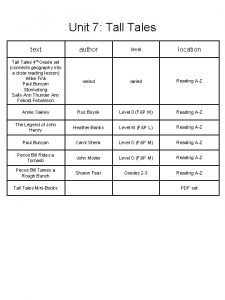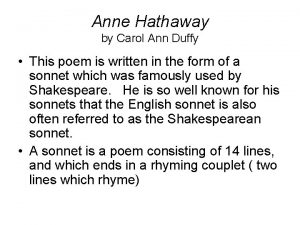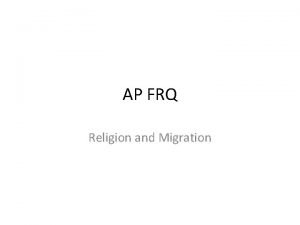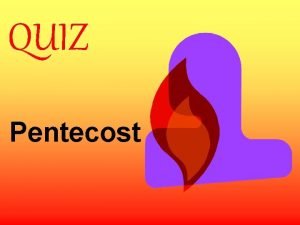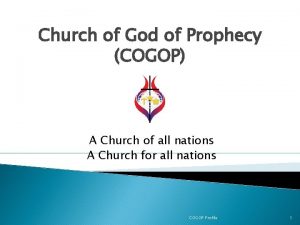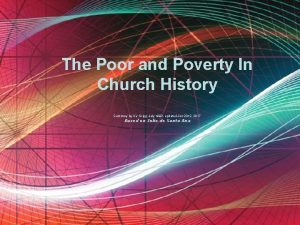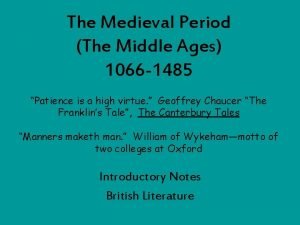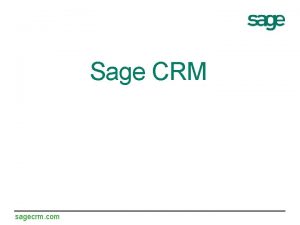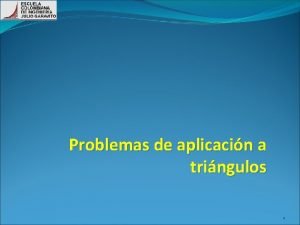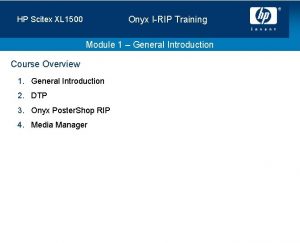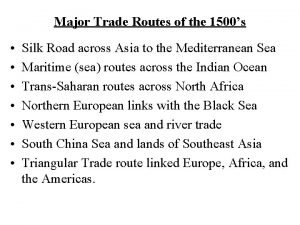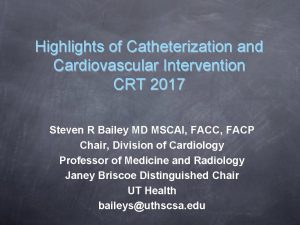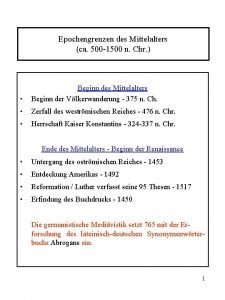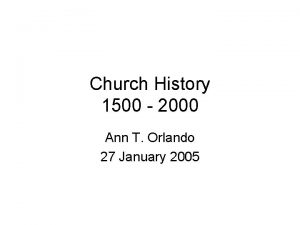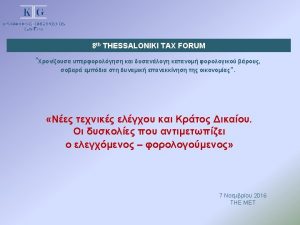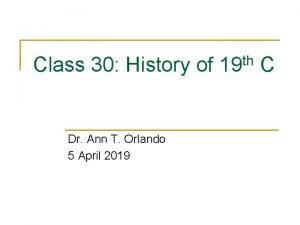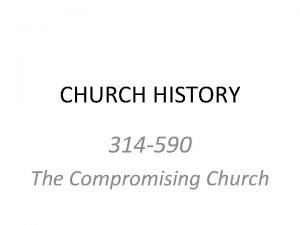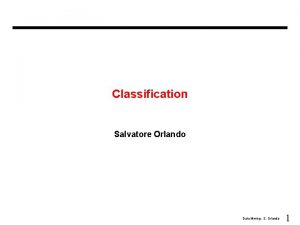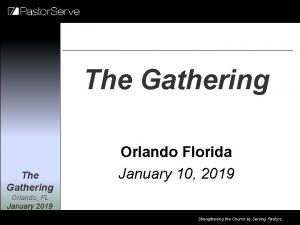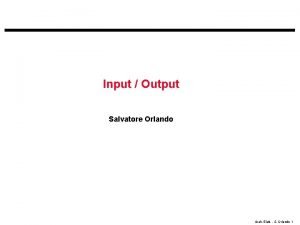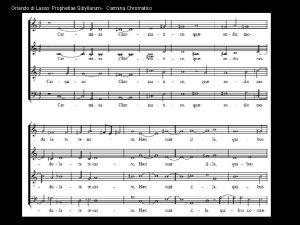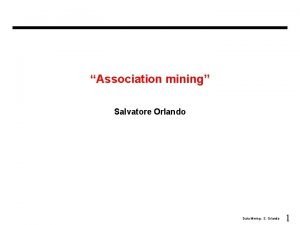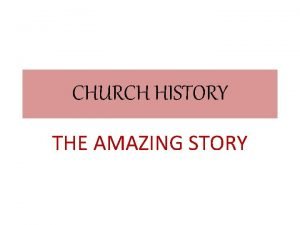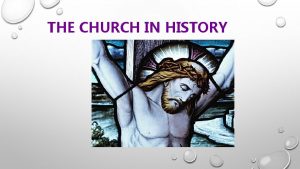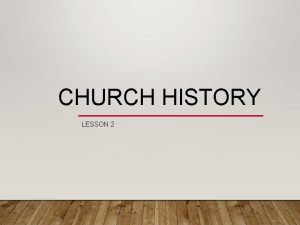Church History 1500 2000 Ann T Orlando 27
















- Slides: 16

Church History 1500 - 2000 Ann T. Orlando 27 January 2005

Overview • • • Summary from last week Beginnings of Reformation Spread of Reformation Council of Trent European voyages of discovery and colonization Enlightenment Revolutions Vatican II

Review from Last Week • Very weakened papacy – Avignon papacy – Counciliar movement; multiple claimants to papacy – Papacy ‘captured’ by wealthy Roman and Florentine families • Increasingly independent kings – 100 years war between France and England • Social disruption: plague, fall of Constantinople • Universities places of increasingly obscure scholastic disputations

Beginnings of Reformation • The straw that broke the camel’s back: 1517, Albrecht of Mainz wants to be Archbishop – Albrecht buys his archbishopric from Rome (sin of simony); Rome needs the money in part to help pay for rebuilding of St. Peters – Rome authorizes the preaching of a special indulgence in Germany, with the money to go to Albrecht to repay him • Martin Luther (1483 -1546) – Responds to this situation with 95 Thesis – Go far beyond denouncing sin of simony and corruption; fundamentally calls into question Rome’s primary and theology of indulgences; denounces scholasticism – German princes support Luther against Rome • Note: 16 th C reform movements attacked doctrine, not just practice as Medieval reform movements had done

Lutheran Theology • Sola Scriptura – Rejection of philosophical developments; Scripture is all that one needs – Scripture should be available to everyone, unmediated; Luther translates Bible into German – Return to original Biblical languages for Biblical study; reject any OT books not written in Hebrew (deutrocanonical books) • Sola Fides – Faith in Jesus Christ is necessary and sufficient for salvation – Universal priesthood of all believers • Sola gratia – Only God’s grace can save you – Only two sacraments: Baptism and Eucharist

John Calvin • Calvin (1509 - 1564) born in France, studied law • Accepted Luther’s maxim “Sola Scriptura, Sola Fides, Sola Gratia) and extended it – Accepted double predestination – Rejected real presence in Eucharist • Established a ‘holy’ city in Geneva • Calvinism, had an extensive influence on Protestant movement, especially in Scotland (Presbyterians), France (Huguenots) and England (Puritans) • Note that all reformers looked to Augustine as their ‘patron saint’

Catholic Response: Jesuits • • • Jesuits (Society of Jesus) founded by Ignatius Loyola (1491 -1556) NOT founded to counter Reformation; but charter put Jesuits on front lines against Reformers Key points in early Jesuit charter (1541): – the vow not to accept ecclesiastical dignities; – special relationship to Pope – increased probations. The novitiate is prolonged from one year to two, with a third year, which usually falls after the priesthood. Candidates are moreover at first admitted to simple vows only, solemn vows coming much later on; – the Society does not keep choir; – it does not have a distinctive religious habit; – it is also said to have been the first order to undertake officially and by virtue of its constitutions active works such as the following: • • foreign missions, at the pope's bidding; the education of youth of all classes; the instruction of the ignorant and the poor; ministering to the sick, to prisoners, etc.

Catholic Response: Council of Trent • Lengthy, intermittent (1545 -1563) – Purpose was both to address reform of practice and to uphold Catholic doctrine • Jesuits play a major theological role at Trent; encouraged explicit statement of Catholic doctrine in opposition to Protestant views – Scripture and tradition – Sacraments are effect through performance of sacramental action; affirmed 7 sacraments – Good works together with faith brings about salvation

Shift in European Culture 16 th-17 th C • Rise of nations and a sense of national culture – Vernacular over Latin as official language • Official religion of a country is defined by the religion of the prince (Peace of Augsburg, 1555) – Definitively settled in West the question of ‘who is in charge’: the king – Development of theory of ‘divine right of kings’

Expansion of European Culture 16 th – 17 th C • Voyages of discovery – Driven by economics – Religion followed economics • Jesuits and Franciscans were primary Catholic missionary orders • Many saw colonization of new world (Western Hemisphere) as a way to escape turmoil of old world

Development of a new secular philosophy: Enlightenment • Science (as we now define it) as the basis for knowledge • Toleration (as we now believe in it) as the basis for religious action in world • Individual rights (as we now accept it), not individual duty, as basis for political systems and law • Human reason can figure it (anything, everything) out; is always making progress – Devalue history, tradition

Catholicism and Science • Galileo (1564 -1642) controversy – Church silences Galileo because of his theory that earth revolved around sun – But the Jesuits also supported Keppler against Protestant attackers – Note part of Robert Bellarmine’s argument against Galileo was that his circular orbits were not consistent with observations; that epicycles explained astronomical observations better • Real question: Where is knowledge to be found? – Church rejects the argument that only science has access to truth; rejects attempts to relativize (trivialize) revelation – In 17 th C Church is in good company: Newton, Boyle

American Revolution: New Political Structures • American Revolution (1776 -1781), based on philosophy of John Locke (1632 -1704) – Champion of individual rights – Religious toleration • Not clear (still isn’t) what is relation between religion and politics in America – Most States have official religion (First Amendment to Constitution only Congress will not establish a religion); see for instance John Adams’ Constitution of Massachusetts – Thomas Jefferson extends this to separation of Church and State (1802) • John Locke, while a champion of individual rights, also a believer in natural law as a subset of eternal law as basis for justice – Thomas Jefferson champions only individual rights; contractual view of justice – T. Jefferson also believed that a new Constitution should be written every 19 years (each generation); no permanence to law

French Revolution: Extreme Enlightenment • Impetus comes from group of 18 th C French philosophers: philosophes • Philosophes embraced John Locke and science; encouraged by American Revolution • Use it as a weapon against ‘throne and altar’ – ‘Smile of Reason’ turns into glare of tyranny – Individual rights and toleration get replaced by suspicion of ‘enemy of people’ and a new ‘religion’; active persecution of Church • Just before the Terror an important defector from Enlightenment: Voltaire; but a defection to skepticism (we really can’t know anything) and disengagement from society

19 th and 20 th C New Nationalisms • 19 th and early 20 th C period of violent revolutions in Europe (France, Italy, Germany, Russia) – Also a period of violent revolutions and wars of independence throughout Western Hemisphere, Asia and Africa • Growth of labor movements opposed to oppression of laissez faire capitalism • Under the pretense of ‘will of the people’ new totalitarian regimes form in many countries • Marxism develops a theory of history and society that portrays religion as a phase that enlightened peoples will out grow • No child of 20 th C can think that Enlightenment has led to a golden age: Shoah, gulags, Rwanda, World Wars, etc.

Catholicism’s Response • Vatican I (1866 -1870) – Reaffirmed that we can have sure knowledge in faith and morals (infallibility of Pope, Thomism as official theology) – Reaffirmed that religion is important to society’s well being – Reaffirm the importance of natural law • Vatican II (1962 -1965) – Toleration defined as toleration of religion against secular societies trying to prevent religious practice – Concern about new economic systems and materialism, whether Marxist or capitalist, that in fact undermine dignity of individual and families – Renewal of liturgical practices; often based upon early Christian practice
 North america, family histories, 1500-2000
North america, family histories, 1500-2000 Stormalong an american tall tale answers
Stormalong an american tall tale answers Carol ann duffy anne hathaway
Carol ann duffy anne hathaway Predominant church affiliation by county 2000 frq
Predominant church affiliation by county 2000 frq St ann arlington
St ann arlington Quiz questions on the history of the church of pentecost
Quiz questions on the history of the church of pentecost Church of god of prophecy flag
Church of god of prophecy flag History of the church summary
History of the church summary Medieval period 1066 to 1485
Medieval period 1066 to 1485 Sagecrm.com
Sagecrm.com Vertical como es
Vertical como es Hp scitex xl 1500 price
Hp scitex xl 1500 price Pix
Pix Trade routes 1500
Trade routes 1500 1500-1382
1500-1382 1500 n chr
1500 n chr What was the life expectancy in 1500
What was the life expectancy in 1500

